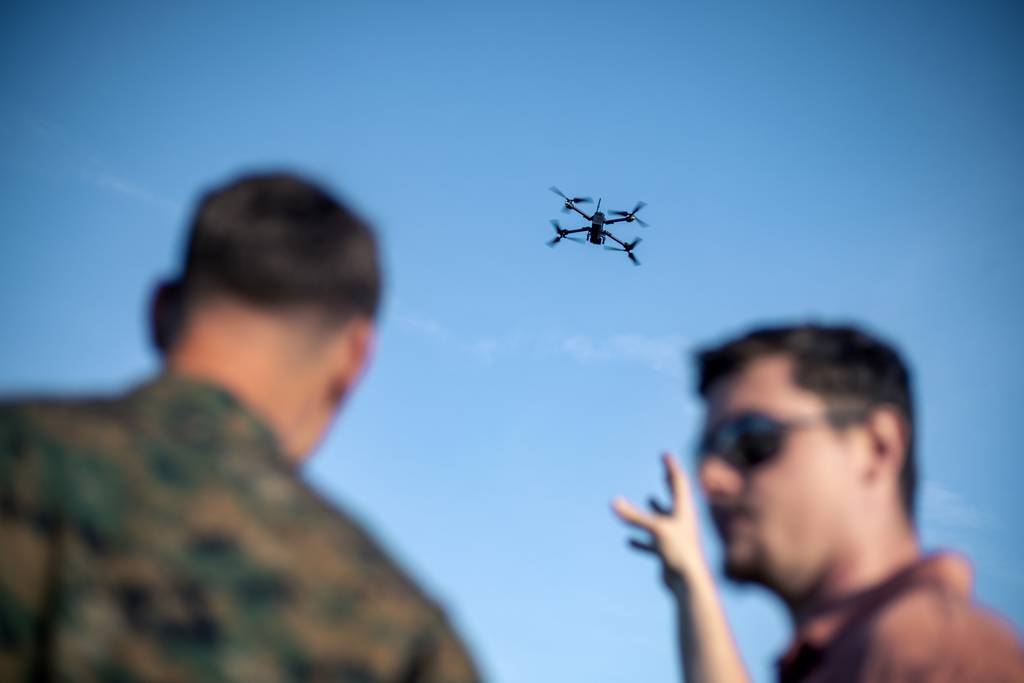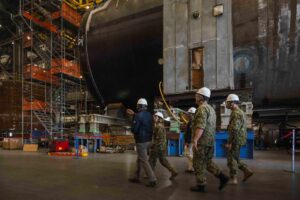
WASHINGTON — The Pentagon’s outdated weapons-buying processes are hampering its ability to integrate innovative technology and work with nimble start-up companies. A panel of defense experts wants to change that.
The Commission on Defense Innovation Adoption, established by the Atlantic Council in 2022, issued 10 recommendations for helping the U.S. Department of Defense overcome its innovation inertia in a Jan. 16 report.
Led by former Defense Secretary Mark Esper and past Air Force Secretary Deborah Lee James, the commission’s proposals center on reforming outdated, bureaucratic practices, creating in-roads for non-traditional companies and private capital and funding programs that aim to quickly scale technology.
“While US companies continue to demonstrate technological prowess, this rate of innovation serves little use in deterring conflict unless the DoD is able to procure and get new technology into the hands of warfighters at a faster pace,” the report states. “The primary objective behind this commission was to take DoD’s acquisition process and Congress’ role in that system out of the Cold War.”
According to the commission, DoD’s struggle to adopt commercial innovation is linked to long, inflexible program planning and execution timelines, a lack of knowledge about emerging technology and a shrinking defense industrial base.
One proposal aims to give acquisition officers more flexibility by letting them manage capabilities in portfolios rather than as independent programs. The move could allow the military services to more quickly respond to changing threats by shifting funds within portfolios.
Another recommendation calls on the Pentagon and lawmakers to strengthen the link between experiments and fielded capabilities, noting that it often takes two-to-four years for the department to buy a system that
The commission proposes that Congress establish a pilot program that would provide $250 million to scale high-need technologies that would help deter aggression from adversaries including China.
“The funds will facilitate the acceleration and scaling of novel capabilities into the hands of the warfighter at the speed of relevance, helping vendors cross the valley of death and incentivizing new non-traditional companies to work with the DoD,” the report states.
Attracting private capital
Congress and DoD have taken steps during the fiscal 2024 legislative cycle that align with many of the commission’s recommendations, due in part to intentional engagement from the task force since releasing an interim report last April.
For example, commissioners recommended the department give the Defense Innovation Unit a greater role in helping field and scale commercial technology. Defense Secretary Lloyd Austin has since elevated the organization to report directly to his office, and the House Appropriations Committee has proposed creating a $1 billion, DIU-managed hedge portfolio aimed at helping quickly field new systems.
As part of a separate recommendation, the commission proposed that the military services should work with the Pentagon’s Office of Strategic Capital to establish pilot programs in FY24 designed to attract private capital toward specific technology projects.
The report notes that the Air Force, Army, Navy and the Defense Advanced Research Projects Agency have made some steps in this area, adjusting requirements to allow more companies who receive most of their funding from venture capitalist firms to participate in small business programs.
Speaking at a Jan. 16 Atlantic Council event, Esper said that while these steps are encouraging, they need to be part of a continued push to change the way the department adopts new technology.
“There is still much work to be done and much progress must be made if the U.S. armed forces are to remain the preeminent military force in the world, capable of handling all challenges, especially the People’s Republic of China,” he said.
Courtney Albon is C4ISRNET’s space and emerging technology reporter. She has covered the U.S. military since 2012, with a focus on the Air Force and Space Force. She has reported on some of the Defense Department’s most significant acquisition, budget and policy challenges.
- SEO Powered Content & PR Distribution. Get Amplified Today.
- PlatoData.Network Vertical Generative Ai. Empower Yourself. Access Here.
- PlatoAiStream. Web3 Intelligence. Knowledge Amplified. Access Here.
- PlatoESG. Carbon, CleanTech, Energy, Environment, Solar, Waste Management. Access Here.
- PlatoHealth. Biotech and Clinical Trials Intelligence. Access Here.
- Source: https://www.defensenews.com/battlefield-tech/2024/01/16/defense-innovation-hindered-by-cold-war-era-practices-experts-say/
- :has
- :is
- $1 billion
- 10
- 16
- 1st
- 2012
- 2022
- 2024
- 70
- 9
- a
- ability
- Able
- About
- acceleration
- acquisition
- Adam
- adjusting
- adopt
- Adoption
- advanced
- agency
- aim
- aims
- AIR
- Air Force
- Alexander
- All
- allow
- an
- and
- appropriations
- April
- ARE
- AREA
- armed
- Army
- AS
- At
- attract
- austin
- autonomous
- autonomous systems
- base
- BE
- behind
- between
- Billion
- budget
- bureaucratic
- business
- buy
- by
- calif
- Calls
- capabilities
- capable
- capital
- Center
- ceo
- challenges
- change
- changing
- China
- class
- cold
- commercial
- commission
- committee
- Companies
- company
- conflict
- Congress
- continue
- continued
- could
- Council
- covered
- Creating
- Cross
- cycle
- Death
- Defense
- Defense Advanced Research Projects Agency
- demonstrate
- demonstrates
- Department
- department of defense
- deputy
- designed
- directly
- Director
- DoD
- done
- doug
- due
- during
- elevated
- emerging
- Emerging Technology
- encouraging
- engagement
- especially
- establish
- established
- Event
- example
- execution
- experiments
- experts
- facilitate
- Facility
- faster
- field
- firms
- Fiscal
- Flexibility
- Focus
- For
- Force
- Forces
- Former
- from
- funding
- funds
- get
- Give
- greater
- Handling
- Hands
- Have
- he
- hedge
- help
- helping
- hindered
- his
- House
- HTTPS
- if
- images
- in
- incentivizing
- Including
- independent
- industrial
- inertia
- Innovation
- innovative
- innovative technology
- integrate
- Intentional
- interim
- into
- Issued
- IT
- ITS
- james
- Jan
- jpg
- knowledge
- Lack
- Last
- lawmakers
- Lee
- left
- Legislative
- letting
- LINK
- linked
- little
- Long
- made
- many
- mark
- Military
- million
- more
- most
- move
- much
- must
- Need
- New
- nimble
- Notes
- noting
- novel
- objective
- of
- Office
- Officer
- officers
- often
- on
- organization
- out
- Overcome
- Pace
- panel
- part
- participate
- past
- pentagon
- people’s
- pilot
- planning
- plato
- Plato Data Intelligence
- PlatoData
- policy
- portfolio
- portfolios
- practices
- preeminent
- primary
- private
- process
- processes
- procure
- Program
- Programs
- Progress
- projects
- proposal
- Proposals
- proposed
- proposes
- provide
- prowess
- Push
- quickly
- Rate
- rather
- receive
- Recommendation
- recommended
- releasing
- relevance
- remain
- report
- Reported
- reporter
- Republic
- Requirements
- research
- Respond
- Role
- s
- Said
- San
- San Mateo
- say
- Scale
- scaling
- secretary
- separate
- serves
- Services
- she
- SHIFTING
- should
- significant
- since
- small
- small business
- some
- Space
- Space Force
- specific
- speed
- Start-up
- Start-up Companies
- States
- Steps
- Still
- Strategic
- Strengthen
- Struggle
- system
- Systems
- Take
- taken
- takes
- Task
- task force
- technological
- Technologies
- Technology
- than
- that
- The
- the world
- their
- Them
- These
- they
- this
- threats
- timelines
- to
- toward
- u.s.
- U.S. Department of Defense
- unit
- us
- use
- Valley
- vendors
- venture
- venture capitalist
- Visit
- wants
- war
- was
- Way..
- while
- WHO
- will
- with
- within
- Work
- world
- would
- years
- zephyrnet












